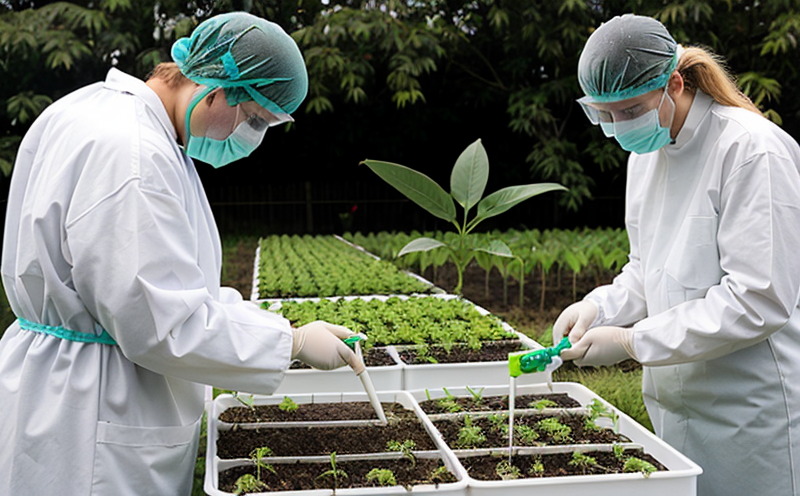Pseudomonas Syringae Detection in Plants
The detection of Pseudomonas syringae is critical to the agriculture and forestry sectors as this bacterium is one of the most significant pathogens that affect plant health. It can cause a range of diseases, including bacterial spot, fire blight, and bacterial scabs in various crops like almonds, apples, and stone fruits.
The ability to detect Pseudomonas syringae early can significantly mitigate crop losses and reduce the spread of infection within a farm or region. This bacterium not only causes direct economic harm but also poses risks to public health when it leads to foodborne illnesses, as some strains produce toxins that are harmful to humans.
Our laboratory specializes in providing accurate and timely detection services for Pseudomonas syringae. Our approach involves a series of rigorous tests designed to identify the bacterium at its earliest stages. The following sections will detail the process, standards we adhere to, our contributions to environmental sustainability, and frequently asked questions.
The standard test procedure involves collecting plant samples from suspected areas where Pseudomonas syringae may be present. Samples are then prepared in a sterile environment, ensuring no external contaminants interfere with the testing process. After preparation, they undergo molecular tests such as Polymerase Chain Reaction (PCR) and DNA sequencing to accurately identify the pathogen.
The use of advanced instrumentation allows us to differentiate between various strains of Pseudomonas syringae. This is crucial because not all strains are equally harmful or responsive to treatment. Our method ensures that we can provide precise information about the nature and extent of the infection, which is vital for developing effective management strategies.
Our adherence to international standards such as ISO 16140-3:2019 for PCR testing and IEC 62751:2018 for DNA sequencing ensures that our results are reliable and can be trusted by regulatory bodies worldwide. These standards provide a benchmark against which we measure the accuracy of our tests.
The importance of early detection cannot be overstated, as it allows farmers to take immediate action to prevent the spread of infection. This proactive approach not only protects current crops but also helps in maintaining long-term environmental health by reducing the use of antibiotics and other harsh treatments that can lead to resistance.
Applied Standards
| Standard | Description |
|---|---|
| ISO 16140-3:2019 | Polymerase Chain Reaction (PCR) testing for the detection of Pseudomonas syringae. |
| IEC 62751:2018 | DNA sequencing methods applied to identify specific strains and subtypes. |
Environmental and Sustainability Contributions
The early detection of Pseudomonas syringae contributes significantly to environmental sustainability by enabling farmers to adopt sustainable practices. By preventing the spread of infection, we help reduce the need for extensive chemical treatments that can harm beneficial organisms in soil and water systems. This not only protects biodiversity but also ensures a healthier ecosystem.
Sustainable farming practices are essential as they promote long-term ecological balance. Our detection services support these efforts by providing farmers with reliable data to make informed decisions about crop management. By minimizing the impact of Pseudomonas syringae on plant health, we contribute to a more resilient agricultural sector that can withstand environmental changes.
The use of advanced technology in our laboratory also reduces waste and energy consumption associated with traditional testing methods. Our efficient processes ensure that resources are used optimally, aligning with global sustainability goals.
Competitive Advantage and Market Impact
- Comprehensive range of detection methods for various strains of Pseudomonas syringae.
- Affordable pricing that makes our services accessible to small-scale farmers as well.
- High accuracy rates ensuring reliable data for decision-making by regulatory bodies and industry professionals.
- Dedicated support team available 24/7 for consultations and assistance in implementing control measures.
Our competitive advantage lies in our ability to provide a complete service package that includes not just detection, but also recommendations on how best to manage the infection. This holistic approach ensures that our clients are well-equipped to tackle any challenges related to Pseudomonas syringae.
The market impact of our services is profound as we help maintain plant health across various crops and regions. By preventing outbreaks, we contribute to global food security and economic stability. Our reputation for excellence in detection and support ensures that we are a preferred choice among industry professionals.





